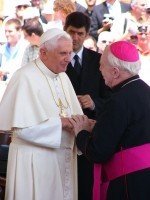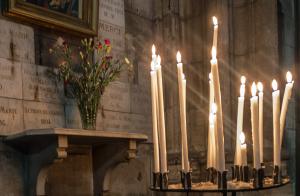
Pope Emeritus Benedict XVI recently addressed the crisis of sexual abuse in an essay which he intends to assist the Church in its dealing with the fallout of the scandal. Although his ideas about the issue differ from Pope Francis,’ he does not overtly contradict the Holy Father; rather, his commentary and recommendations add an additional perspective to the current viewpoint. The pope emeritus says he contacted the Holy Father himself before publishing his text.
To begin, he assigns responsibility for the crisis to the sexual revolution, the disintegration of Catholic moral theology, and the ushering in of relativism. With regard to the sexual revolution, Benedict states, “It could be said that in the 20 years from 1960 to 1980, the previously normative standards regarding sexuality collapsed entirely, and a new normalcy arose.” He cites examples of the normalization of pornography and controversial sex education in the 1970s and 1980s in Europe. He states that the rise of pedophilia was a result of the sexual freedom of the times, which also had a detrimental effect on the formation of the next generation of priests.
In addition to the cultural crisis, the Church was facing a crisis from within. “At the same time, independently of this development, Catholic moral theology suffered a collapse that rendered the Church defenseless against these changes in society,” he asserts. Moral theology in the Church shifted from one based on the natural law to one increasingly based on the Bible. Relativism took hold as a result, he says, eliminating the ideas of “absolute good” or “fundamental evil.” He states that during Pope John Paul II’s pontificate, the Catechism of the Catholic Church and Veritatis Splendor were released, denouncing this movement away from morality as proclaimed by the Church, and the release of the documents met with adverse reaction and opposition from moral theologians. Along with the crisis in moral theology, the authority and infallibility of the Church was being questioned during this time.
In addressing the reaction of the Church to these crises, Benedict again refers to the radicalism of the 60’s and its influence on the Church and cites examples of secularism and sexual license in seminaries during this time. “In various seminaries homosexual cliques were established, which acted more or less openly and significantly changed the climate in the seminaries,” he states. In addition, certain bishops were introducing a new modernity into the Church and abandoning Catholic tradition.
He recalls that pedophilia surfaced and became problematic for much of the Church in the second half of the 1980s but was already an issue in the United States. In Church criminal proceedings dealing with these cases, the rights of the accused took precedence and convictions were nearly impossible. The pope emeritus and Pope John Paul II assigned the cases to the Congregation for the Doctrine of the Faith, making the penalty of expulsion from the clergy possible, given clear proof of the crime. He credits Pope Francis with continuing to implement further reforms.
To address the question of what should be done to remedy the crisis the Church finds itself in today, the pope emeritus first reasserts the existence of a God of love who primarily reveals and expresses himself to us by becoming man and speaking as man to us human creatures. God is love, he stresses, and adds, “the power of evil arises from our refusal to love God… A society without God – a society that does not know Him and treats Him as nonexistent – is a society that loses its measure.” Pedophilia became so rampant because of the absence of God, he asserts, and to remedy the situation he calls for a return to recognizing God as the foundation of our life instead of a peripheral concern. He issues a call to bring God to the forefront of society and our lives.
Secondly, he submits that the Church needs an increased reverence and appreciation for the Real Presence in the Eucharist. He bemoans the lukewarm and indifferent manner in which many today approach the Body and Blood of Christ, and suggests that for a large portion of Catholics, reception of the Eucharist is purely ceremonial. He calls for a restoration of “Faith in the Reality of Jesus Christ given to us in the Blessed Sacrament.”
Lastly, he calls for a renewal of the Church. Some propose creating a new Church; however, the pope emeritus labels this idea a proposal of the devil and contends that, although filled with sinners, the Church remains the Holy Church and is indestructible. He encourages us as the people of the Church to establish “habitats of Faith” to support its members. In closing, Benedict thanks Pope Francis for his work leading the flock and continuing to show us the “light of God.”











